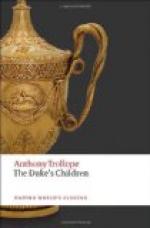‘Poor boy!’ she said to herself as she was dressing. ‘Poor boy!’ Then, when the evening was over she spoke to herself again about him. ‘Dear sweet boy!’ And then she sat and thought. How was it that she was so old a woman, while he was so little more than a child? How fair he was, how far removed from conceit, how capable of being made into man—in the process of time! What might not be expected from him if he could be kept in good hands for the next ten years! But in whose hands? What would she be in ten years, she who already seemed to know the town and all its belongings so well? And yet she was as young in years as he. He, as she knew, had passed his twenty-second birthday,—and so had she. That was all. It might be good for her that she should marry him. She was ambitious. And such a marriage would satisfy her ambition. Through her father’s fault, and her brother’s she was likely to be poor. This man would certainly be rich. Many of those who were buzzing around her from day to day, were distasteful to her. From among them she knew that she could not take a husband, let their rank and wealth be what it might. She was too fastidious, too proud, too prone to think that things could be with her as she liked them! This last was in all things pleasant to her. Though he was but a boy, there was a certain boyish manliness about him. The very way in which he had grasped at her hand and had then blushed ruby-red at his own daring, had gone far with her. How gracious he was to look at! Dear sweet boy! Love him? No;—she did not know that she loved him. That dream was over. She was sure however that she liked him.
But could she love him? That a woman should not marry a man without loving him, she partly knew. But she thought she knew also that there must be exceptions. She would do her very best to love him. That other man should be banished from her very thoughts. She would be such a wife to him that he should never know that he lacked anything. Poor boy! Sweet dear boy! He, as he went away to his dinner, had his thoughts also about her. Of all the girls he knew she was the jolliest,—and of all his friends she was the pleasantest. As she was anxious that he should go to work in the House of Commons he would go to work there. As for loving her! Well;—of course he must marry some day, and why not Lady Mab as well as anyone else.
CHAPTER 17
The Derby
An attendance at the Newmarket Second Spring Meeting had unfortunately not been compatible with the Silverbridge election. Major Tifto had therefore been obliged to look after the affair alone. ‘A very useful mare,’ as Tifto had been in the habit of calling a leggy, thoroughbred, meagre-looking brute named Coalition, was on this occasion confided to the Major’s sole care and judgement. But Coalition failed, as coalitions always do, and Tifto had to report to his noble patron that they had not




